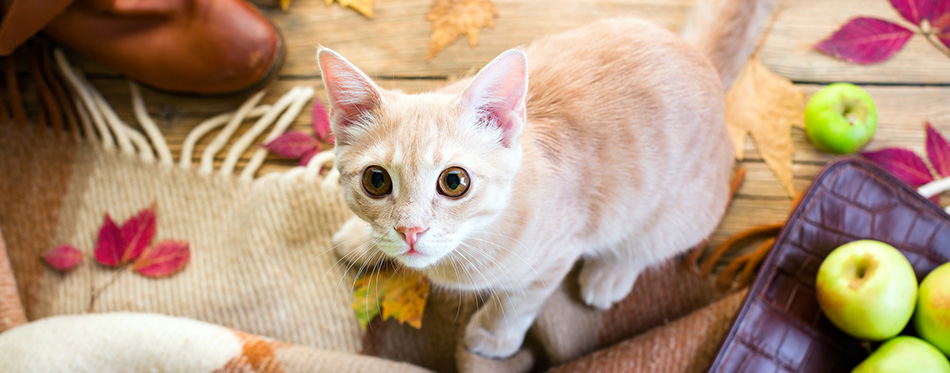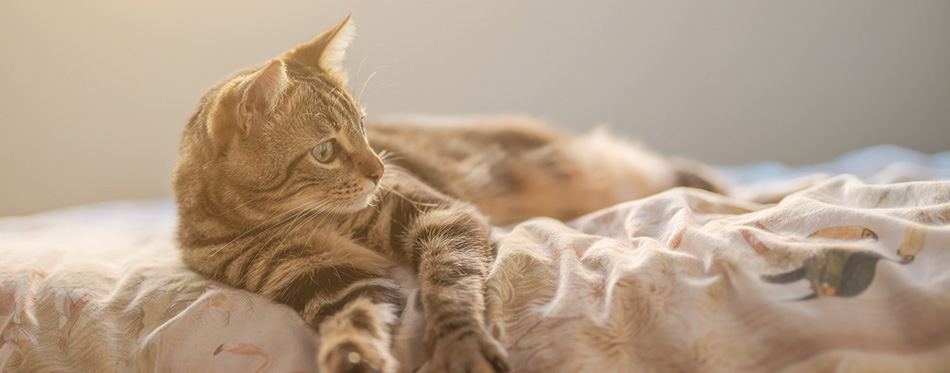Although cats sucking on blankets may sound like unusual behavior it’s actually quite common and can be found in many adult cats as well as kittens. If you’ve never seen or heard of this, either your cat belongs to the group of cats which don’t typically show this behavior or maybe you’re a soon-to-be cat parent and eager to learn about feline health and wellbeing. Either way, this behavior is certainly interesting and doesn’t have a singular cause which makes it even more fascinating. We recommend making a quick search on YouTube for cats sucking on blankets and you won’t be disappointed. This adorable behavior often accompanies kneading and makes for a heart-warming display of kitty affection.
There are many possible reasons for this behavior and cat scientists and experts don’t have any conclusive findings on why this happens. The information we do have, however, is speculative but widely considered to be the most likely causes. So, whether you’re looking for answers to your cat’s strange behavior or you’re just curious about this odd-sounding phenomenon, let’s have a look at why cats suck on blankets.

Instinctive Behavior
Natural instinct is possibly the most widely accepted and understandable reason for this behavior. It’s generally believed that this resembles the instinctive behavior of suckling when the kitten is young and needs feeding from its mother. If this trait doesn’t stop after infancy it can remain prominent late into the adult cat’s life. While they might not be suckling anything for a specific purpose, blankets, towels or other softly woven fabrics are often the object for this behavior as they resemble their mother’s warm, fluffy body.
It’s recommended that young kittens should not be separated from their mothers for at least 8 weeks, if possible. If this isn’t possible or they are removed from their mother’s care prematurely, some kittens may show infant behaviors into adulthood – possibly in the form of sucking blankets, towels or other soft fabrics. However, they sometimes show this behavior purely because it is an instinctively comforting action which they develop in childhood. If you’ve noticed this behavior in your cat and know they grew up without their mother around, it could be possible that they’re just showing instinctive kitty behavior which they haven’t grown out of yet. Although this isn’t overly popular, it’s perfectly healthy and safe behavior so you shouldn’t be concerned about your kitty’s characteristics!
Relaxation
Just as some cats might relax by slouching across the sofa, giving themselves a bath or lying in the sun, some kitties find sucking on blankets to be a particularly good way to relax. It might be caused by the previous reason, as an instinctive behavior which relaxes them, or as an action they actively choose to do simply for its relaxing properties. If you see your cat doing this as they sit down to relax, it could just be a sign that they are comfortable in the environment. Considered like this, suckling on blankets or fabrics could be just like kneading as it is a behavior shown in a comfortable environment before the cat relaxes.
This behavior has been documented in infancy following the weaning stage as little kittens find it relaxing to suck on soft fabrics when they first begin their adult diet. If your kitten is just starting their grown-up diet and you notice this behavior, don’t worry, it’s perfectly normal and to be expected while they’re at that age. If the behavior continues into adulthood this doesn’t necessarily mean anything is wrong, some cats grow out of the behavior while others simply don’t.
It’s in Their Genes
Some cat breeds are more prone to this behavior than others which may explain why your cat sucks on blankets while others might not. Some Eastern cat breeds are more likely to suckle into adulthood compared to European or North American breeds. Tonkinese, Balinese and Siamese are some of the most popular breeds which display this behavior throughout adulthood, so you can expect this behavior from them as it’s perfectly healthy.
Unfortunately, this behavior isn’t always healthy in other cats so it’s worth keeping an eye on your cat’s behavior and health. Here are some things to look out for if you think they might be doing this too often or compulsively.
Mental Health
Some cats can develop anxiety or stress disorders which affect their behavior. This behavior can be in the form of shyness, aggression, or generally odd social behavior caused by environmental triggers. Some cats may scratch at surfaces when stressed or hide away from people when anxious, and some cats will suck on blankets as a form of stressed behavior. As we’ve covered, sucking on blankets, towels or other soft materials can bring a sense of comfort to some cats so it’s generally believed that they will do this to relax from stress. This form of relaxation can become obsessive if a cat remains in a stressed environment so it’s important to note how frequently your feline is feeling like this.
This behavior is believed to be a common result of mental health issues, however there are no known physical conditions which result in this behavior as a symptom. So, it’s likely that stress and anxiety are the main causes for this behavior becoming compulsive. If you think your cat may be experiencing these problems, then it’s crucial you contact the vet and look at your options for reducing stress. Your poorly feline friend might not need any medication, inistead some lifestyle changes may be enough to fix this problem.
Boredom
While this is similar to mental health, boredom can be more obvious and easier to fix. If you work away from home and have to leave your kitten alone all day in the house, they could become bored by a lack of physical and mental stimulation. If you come home to find little damp or chewed areas of your cat’s blankets or other fabrics that are out in the open all day, this could be a sign that your cat is bored and is sucking on them to stay busy. This is essentially another form of stress so should be monitored as carefully and fixed as soon as possible. Simply by placing different toys around the house or purchasing more stimulating toys you may be able to fix the problem. So, your cat’s obsessive suckling behavior might just be a sign that they’re a bit bored and require some more stimulation. Luckily, you can fix this by providing stimulating toys which produce a reward or put aside more time to play with them after a day at work. Afterall, they just want attention from their favorite human! If you are looking for more options, check out our guide on the best cat interactive toys.

Keeping Your Kitty Calm
If your cat has only recently developed this behavior then think about any changes you may have made to their diet, living conditions or new items you have introduced to your house which the cat might be exposed to. Some particularly shy cats can be overly sensitive to new objects until they become used to them so you could gradually expose them to new things over a period of time which should help to reduce their stress-levels.
Some cat experts suggest changing around their living space gradually if they seem stressed. For example, if their litter tray, bed, feeding bowls and toys are all confined to one room, your cat may feel stress similar to a feeling of claustrophobia. By moving the bed somewhere else (such as your bedroom or another social space) they may feel less confined and more relaxed. If you think you’ve found the root of your cat’s stress, monitor their suckling behavior after removing the cause of their stress. If this hasn’t helped or if you’re unsure of what might be causing your kitty to stress like this, speak to the vet as they may have alternative ways of helping. This could be in the form of anti-anxiety medication or other lifestyle suggestions which you might not have considered.
Related Post: Cat Calming Sprays
As we’ve learned, obsessive suckling behavior can be caused by stress, anxiety or boredom. If you think your cat has just started showing signs of this behavior you may be able to prevent it developing further simply by keeping them distracted. Sure, stimulating toys might be enough to help, but some other items might come in handy, too! Catnip spray, oil or stuffed toys can be excellent distractions which will keep your feline friend feeling happy until they forget about their obsession. Used carefully and well-timed catnip products or other effective relaxation toys may be perfect for distracting your cat and can stop this behavior from getting any worse.
Final Thoughts
Hopefully, after reading this you’ve learned a few things you might not have previously known about cat behaviors and how to deal with them. Although sucking on blankets is a normal, healthy behavior, its important to keep an eye on them just in case any problems arise. But if it’s only occasional, this is healthy, normal and adorable behavior which isn’t a cause for concern.

